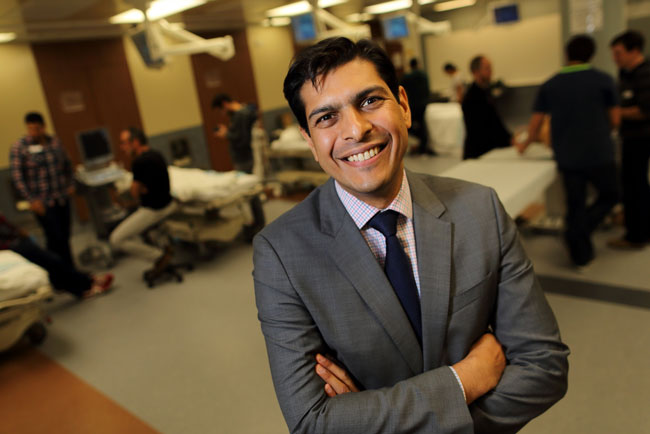
Courtesy of the Royal College of Physicians and Surgeons of Canada
For Rajesh Aggarwal, MBBS, MA, PhD, FRCSC, FACS, Assistant Professor of Surgery, and Director of the Steinberg Centre for Simulation and Interactive Learning at McGill University, “patients expect nothing less than perfection” when they seek care – and simulation-based education can help ensure that health professionals are meeting those high standards.
In addition to preparing physicians and other health providers for every day practice through simulation education and training, a key focus of Dr. Aggarwal’s role as a simulation centre director is also to develop strategies for the adoption and implementation of simulation to enhance patient safety, at a systems level. He has long explored the intersections between simulation, innovation and education throughout his career, and he hopes to bring what he has learned to an interprofessional audience of simulation educators and enthusiasts during the upcoming Simulation Summit in St. John’s, Newfoundland and Labrador, October 14 -15.
The 2016 Simulation Summit plenary speaker recently sat down with the Royal College of Physicians and Surgeons of Canada for an exclusive Q&A, to talk about how his interest in simulation education first developed; why he thinks simulation is crucial in 21st century medical education; and what attendees can expect from his plenary lecture.
Rajesh Aggarwal (RA): I first got engaged with simulation when I was a junior resident in London (UK) in 2002.
At the time, we were grappling with new work time directives, which essentially meant that we could no longer work as we pleased, and would have to go home after a night shift, even if there was clinical work to do. I used to love staying late, and even coming in on weekends to assist in surgical cases. With this new directive, I was really concerned as to how I would be able to get all the experience I needed to be competent at the end of my training. It was just a few weeks later that I was at the National Surgical Congress in the UK, and saw Professor Ara Darzi give a talk on simulation training using virtual reality devices, for laparoscopic surgery. I was absolutely hooked; managed to arrange a meeting with Professor Darzi, and the next year, started my PhD in virtual reality simulation for laparoscopic surgery, at Imperial College London.
RA: Our patients expect nothing less than perfection from us as their caregivers, and we should strive to use all the tools available to achieve this for them. Whilst the majority of clinical training still takes place in the patient setting, we can – and must – do better.
There is excellent data in the literature with regard to the role of simulation for central line insertion, team-training, and laparoscopic surgery; to name but a few. However, it is only recently that these research studies have been expanded to mandates – for example, in the case of the Fundamentals of Laparoscopic Surgery (FLS) program, which is a pre-requisite for completion of surgery residency training in the United States.
Moreover, simulation-based education allows us to practice those low-frequency, high-severity events, such as malignant hyperthermia, or emergency conversion from laparoscopic to open surgery to attain competence and maintain performance. We are also working in a much more team-orientated approach nowadays, and it is important to practice these new care models to ensure their implementation is without error.
RA: At the Steinberg Centre for Simulation and Interactive Learning, we train a variety of health care providers, including the Canadian Armed Forces. When they run a simulation session at the Centre, it is really very engaging, with respect to multiple casualties, requiring urgent life-saving attention. The soldiers take this extremely seriously, as it may be their only chance to acquire the skills to be able to manage one of their critically injured colleagues, or a civilian caught in cross fire. We pride ourselves at the Centre for being able to do this well, knowing that our work is having an impact at a global scale.
SS: What can participants expect from your plenary address during the 2016 Simulation Summit?
RA: I think the most important thing to consider will be how we can leverage the current status of simulation at leading centres to impact upon the day-to-day clinical care we provide to our patients.
Another aspect I wish to discuss is the multi-disciplinary nature of simulation research, by engaging expertise not only from the domain of education, but also from arenas such as computer science, engineering, health outcomes, social sciences and health economics. I believe that by leveraging the knowledge and diversity of thought in these areas, we will be able to think of simulation not only in regards to the education of trainees, but as having a much wider impact on health care in general; in areas such as patient education, medical device development, and design of new health care processes and environments.
Dr. Aggarwal is also the incoming chair for the 2017 Simulation Summit in Montreal, Quebec.
Click here to learn more about the 2016 Simulation Summit.
June 14, 2016
